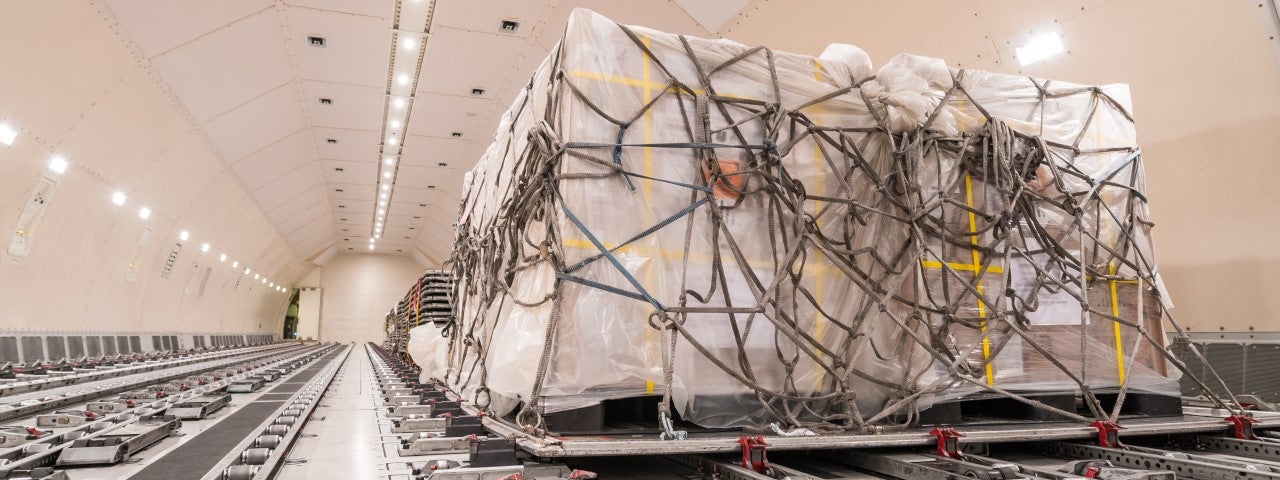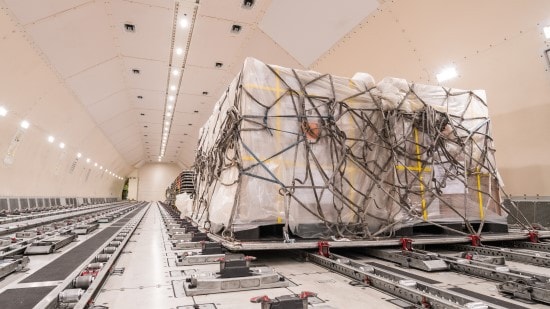Transforming commercial aircraft for cargo charters
Before Covid-19, up to 80% of air freight travelled in the cargo holds of scheduled passenger planes. When the pandemic halted most scheduled services, airlines started converting commercial aircraft into freighters (or ‘preighters’).
This clever solution has helped to minimise the number of grounded aircraft, maintain supply chains and transport vital medical goods around the world. Two years on, preighters remain in high demand – and Air Charter Service is at the forefront of this continuing trend for chartering converted passenger planes to transport cargo.
How do you transport cargo in a passenger aircraft?
It sounds simple – while there are no passengers on board, just fill the cargo hold and remove seats from the main body to make more space for goods. In reality, however, asking a passenger aircraft to carry freight is like asking a cruise ship to carry shipping containers.
It’s feasible (the cruise ship is, after all, a boat), but it’s not what the boat was designed for. Passenger planes have toilet and crew spaces, small doors, floors that aren’t reinforced and a weight limit far lower than ready-made cargo aircraft.
But despite these logistical hurdles, over the past two years, it’s become commonplace to convert passenger planes to transport cargo. Some airlines use specialists to retrofit aircraft for an inanimate payload, which often costs more than purchasing the plane in the first place; while others simply pile cargo onto passenger seats and secure the load with netting and rope, being careful not to exceed the aircraft’s maximum takeoff weight.
How ACS fills the gap
During the Covid-19 pandemic, operators have struggled to transport cargo in line with global demand. Air Charter Service’s dedicated aircraft leasing team has stepped in to source the extra aircraft needed, as the division’s director Scott Collier explains.
“Airlines have been turning to ACMI leasing in these unprecedented times, as it allows them to meet the increased demand for freight capacity whilst still being able to react quickly to the ever-changing needs of a dynamic aviation market.
“Air Charter Service’s market-leading leasing team is known for its unrivalled industry knowledge, operational expertise and strong supplier relationships. Quickly identifying industry trends, our experts source aircraft for a range of global buyers and operators, which can then be adapted to carry cargo and ease the strain on the global supply chain.
“Our specialist leasing division handles every aspect of each contract with a forward-thinking approach. In some cases, we’ve even stepped in to ensure a charter runs smoothly, such as in Birmingham in 2021.”
Why are preighters still needed?
Even though the worst of the pandemic appears to be over and air passenger travel is on the rise, there’s still a booming market for ‘preighter’ charters. “This is due to continued global demand for cargo capacity, coupled with limited availability of full freighters, both of which are likely to continue into 2023,” says Scott.
“Many countries have placed long-term orders for vaccines, testing kits and PPE, plus the cross-border e-commerce market is booming – both of which are key drivers for such high demand for converted passenger planes to transport cargo.”
Learn more about how our cargo or leasing teams can fulfil your charter needs.

 The practice of using passenger aircraft to transport cargo remains in high demand – and Air Charter Service is at the forefront of the trend.
The practice of using passenger aircraft to transport cargo remains in high demand – and Air Charter Service is at the forefront of the trend.



